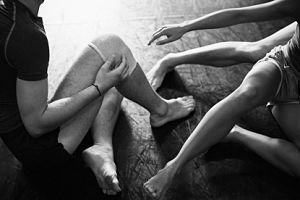Have you ever wanted to just get real with your students? I mean “really real?” Not in a way that’s going to ruin their self-esteem or deter them from their accomplishments or anything, but tell them what’s up in an up- front way so that they do succeed and learn to take responsibility for things they can correct and improve upon. One of the greatest disservices we can do for our students is to not be straight with them; albeit with tact and sensitivity, but sometimes you have to have the nerve to just say it how it is and trust they know it’s said with love and coming from the best place possible.
As of late, I have watched students who fall out of turns, can’t land jumps or leaps, can’t hold a balance in relevé, don’t remember choreography and then listen to them go into an entire soliloquy as to why they fell out of that turn, why their jump wasn’t right, why they can’t balance that day and why they don’t know their choreography. I’ve heard things like, “ugh, the floor is bad today,” “the floor is too slippery,” “It’s my shoe,” “I suck today because I had a math test I’m thinking about,” “Why are people talking right outside the studio, it’s distracting me?” etc. etc. etc. etc. Sometimes I sit and look at them in amazement as I’m hearing the words come out of their mouths as to how they’ve come to blame everything under the sun other than taking responsibility for their own technique. I’ve gotten to a point now where (with a dry smile,) I just sit and let them finish stating their case, because I have no doubt that deep down either A) They really believe these reasons because they’ve convinced themselves it’s truth or B) Need to justify these things to me because they know that I know the real reasoning and hope that somehow I believe their excuse if said heartfelt enough.
Well….sorry kiddo….I’ve been around the block a few times and been around long enough. During my training and even during professional performances where things didn’t go quite right, I never blamed the floor; not even a legitimate injury. I danced with fresh open wounds, bleeding blisters and ripped skin. I danced on raked floors; wood floors with splinters come up out of them, floors that weren’t level with dips and divots in them. I danced in studios in 100 degree heat with no air-conditioners or fans, the windows were broken and couldn’t open and there were 150 sweaty people dancing next to me. I never blamed missing an entrance because a “quick change” wasn’t long-enough. I never blamed a costume malfunction or my shoes, or my leotard or the rubber band in my hair from breaking. I never blamed other people’s presence in the room for giving a bad performance. I never forgot choreography because it was a dreary, rainy day outside and I never gave a less than stellar performance with blaming anyone other than myself for not being on my game that day.
But… the reason I was innately able to do that was because I learned to take responsibility for my actions inside and outside of the studio and on stage because of the teachers I had. I learned, from a young age, if you are a dancer you make it work, you figure it out; because the truth is, the conditions you dance in will more times than not be less than perfect. So with love, I now pass the same “tough love” onto my students.
Now after their rendition of “The Blame Game,” I tell them calmly yet matter of fact, “Stop blaming the floor or your shoes. You're not turning because you can’t figure out the mechanics of the turn. Now how are we going to fix that?” Without fail, I then watch as their faces change with the hit of honesty, but trust that this 30 seconds of hurt is going to pass; because what I’m now about to teach them from here forward will give them a lifetime of confidence physically, technically, mentally and emotionally.
Reminding them that something as simple as, “your plié is you best friend, so plié more” is pivotal, because no amount of hairspray on their shoes or “Coking” the floor is going to make them a better turner or help stick their jumps or balances better. A dancer needs to look inward to rely on their training. They need to take responsibility for their own technique and start there. A dancer dances under any condition and circumstance. They don’t blame; plain, simple and true. This is not only an invaluable lesson for them in the studio, but as they move forward in life. Nobody, whether at an audition or in an office wants to hear excuses why the job didn’t get done. Now, taking the first step to accepting the downfall or limitation lies within one’s self. Once they can admit that, there is no limit to the things they can progress and develop and excel at, over time. This also starts with you, their teachers, their mentors. The longer we allow our students to blame inconsequential things, the longer a delay we have in getting to the “real work.” If we want them to succeed, putting an end to enabling the blame game starts with you. So get real and lead them down a path of being honest with themselves. Helping them accept what they need to work on is the first step to helping them succeed.
Good luck!
See you in the studio,
Jessie

